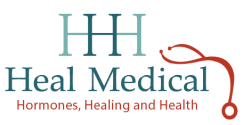Many people are confused about hormone therapy, and rightfully so, as it is an emerging field in medicine and reliable information is difficult to find. Doctors tend to read only scientific literature that is pertinent to their interests, often relying on secondary sources to compile and deliver the essential content of published studies in a concise way.
In other words, many don’t actually read the published studies. Instead, they receive the data as interpreted by various experts or pharmaceutical companies, who often share their biases.
Years ago, my own health issues led to me to study these therapies in depth. My whole life I had been healthy, athletic, with lots of energy and drive. However, in my early thirties, I began to have bouts of depression. My mother was bipolar and I feared that something similar was happening to me—I became terrified of “going crazy.”
I was in medical school at the time and sought help with the learned faculty. I was initially prescribed desipramine but my heart rate went from 60 to 120 and they decided that maybe that was not a good idea. I also had the common side effects of constipation, dry mouth, and poor sleep. After Prozac came out, a kind of dawn came after many dark nights, and I thought I had found the answer. But slowly, I began to realize that I was having trouble thinking clearly, often forgetting my train of thought. I also lost all interest in sex and was unable to have an orgasm. BUT, I was not living in a dark hole of fear (just sort of dispassionately looking over the edge) and I was able to finish medical school, residency and begin work. Over the years I went on and off antidepressants, trying the new ones as they came out: Paxil, Zoloft, Celexa, Lexapro, and others.
I developed an interest in Integrative Medicine (IM) after moving to California in the 90s, and in 2001, I took Andrew Weil’s Integrative Medicine course in Arizona, which introduced me to the world of alternative therapies. At that time I was really struggling with fatigue, depression, and chronic pain–but again, I am tough and I kept going. When we did labs on ourselves as a part of the IM program I was diagnosed with low thyroid function.
I began taking Synthroid, and felt better for a while, but my symptoms would always recur. I would increase my dose only to watch my numbers climb until they were so high I had to reduce my dosage. And even when my numbers were normal, I still felt hypothyroid.
I was also taking oral contraceptives for heavy bleeding. So at that time my cocktail was Lexapro, birth control pills, and Synthroid, and I felt absolutely terrible. Every day after work, as I crossed the beautiful Golden Gate Bridge and returned to my home in Sausalito, I felt like I was descending into darkness. I collapsed on the couch each night too tired and apathetic to do anything else. I was seeing a psychiatrist, an endocrinologist, and a gynecologist—with a different drug prescribed by each of them. None of it was working, really.
Ten years ago, on a whim I attended a Functional Medicine seminar and the light bulbs started to go off. In panel after panel, lecture after lecture, I sat and listened as my symptoms were described, repeatedly as the week went on. I began to understand that my diet and stressful lifestyle had played a huge role in my illness, and that I could change it. It was a slow process, because it turned much of what I had learned in my medical training upside down. I hadn’t really thought about—and had of course never been taught the role that nutrition plays in health.
Over the next several years, I attended many courses and fellowships and educated myself in this new area of medicine. I experimented on myself with various therapies and supplements, and I began to feel my depression lift and my chronic pain subside. Hormonal balance is a key component of these therapies, and when I finally understood this and found a more appropriate hormonal balance, my health truly began to turn around. I continue on thyroid medication and other needed hormones, but I am no longer on antidepressants. My life is full, and I feel better now than I did in my thirties.
You may wonder why all doctors don’t understand hormones, nutrition, etc. . . and the only answer I have is that we were not, and are not, taught this in our training. Hormone replacement remains controversial and supplements and nutritional medicine are relatively new fields for a traditionally trained doctor. There continue to be many naysayers in the medical profession. Many doctors knowledgeable in this new area came to it via their own health concerns, and have stories similar to mine. Contrary to conventional wisdom and dogma, scientific studies abound in the literature to support the use of bio identical hormones as a means to enhance the quality of life and assuage the ravages of chronic disease. Of all the things I have done, the gluten-free diet, consistent exercise and meditation, etc.–the most profound effect on my health has been due to my use of bio identical hormones.
Over the next few weeks, I will look at each of the primary hormones available in these therapies, and talk about their role in the body. I will arm you with information that I hope will help you reclaim your health.





Amazing and wonderful story! I am truly inspired. Thank you for being so generous with your knowledge.
Thanks for your great information, the contents are quiet interesting.I will be waiting for your next post.
jobs in life Sciences